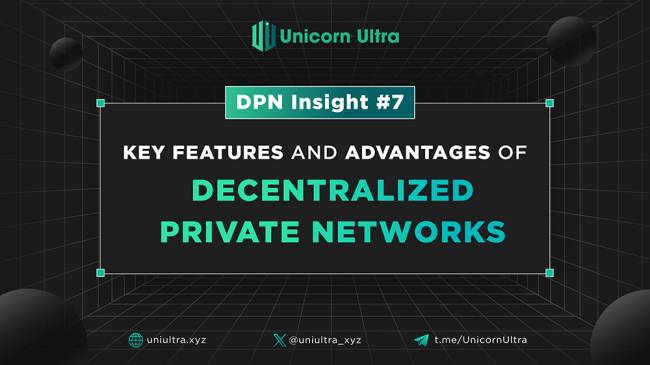Categories: Blockchain
DPN Insight #7: Key Features and Advantages of Decentralized Private Networks
In the ever-evolving landscape of digital security and privacy, Decentralized Private Networks (DPNs) have emerged as a groundbreaking alternative to traditional Virtual Private Networks (VPNs). DPNs offer a suite of advanced features that address many of the limitations inherent in conventional VPNs.
This article delves into the key features of DPNs, highlighting their enhanced security protocols, privacy benefits, and how they reduce reliance on centralized entities, setting them apart from traditional VPNs.

Enhanced Security Protocols in DPNs
DPNs boast state-of-the-art security protocols that significantly elevate the standard of data protection and user anonymity. Unlike traditional VPNs, which primarily rely on a centralized server structure, DPNs utilize blockchain technology to secure data across a network of distributed nodes. This structure ensures end-to-end encryption of user data, enhancing security at every point of the network.
Furthermore, secure communication between nodes in a DPN is fortified by advanced cryptographic techniques, making the network exceptionally resistant to cyber threats such as hacking, phishing, and man-in-the-middle attacks.
Privacy Benefits of DPNs
Privacy is a cornerstone feature of DPNs. The decentralized nature of these networks means that user data is not stored in a single location, significantly mitigating the risk of mass data breaches and unauthorized access. Unlike traditional VPNs, where user data can potentially be logged and monitored by the VPN provider, DPNs distribute data across multiple nodes, ensuring that no single node has complete access to all user information. This setup provides a higher level of data anonymity and privacy, as it is nearly impossible to track or intercept user activities across the decentralized network.
Reduced Reliance on Centralized Entities
One of the most significant advantages of DPNs over traditional VPNs is their reduced reliance on centralized entities. In a conventional VPN setup, the entire network's security and reliability hinge on the central servers and the entity controlling them. DPNs, however, distribute the network load across multiple nodes, eliminating single points of failure and reducing the risk of server downtime. This decentralized model also makes DPNs inherently resistant to censorship and less susceptible to jurisdictional constraints, providing users with unrestricted access to the internet.
Comparison with Traditional VPNs
When compared to traditional VPNs, DPNs offer notable advancements in several areas. The most prominent is in network security: DPNs provide stronger encryption and a more resilient network architecture. In terms of privacy, DPNs offer superior data anonymity and protection against tracking and surveillance.
Additionally, the decentralized framework of DPNs ensures a more democratic and equitable network, where users are not subject to the control or potential data mishandling by a single centralized entity.
Conclusion
Decentralized Private Networks represent a significant leap forward in the quest for digital privacy and security. By offering enhanced security features, superior privacy benefits, and independence from centralized control, DPNs address many of the critical challenges faced by traditional VPNs.
As the digital world continues to grapple with issues of data privacy and cyber security, DPNs stand out as a robust solution, promising a more secure and private future for online communication.
